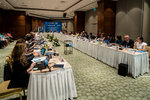Home > News of the Region > News
News

First summer camp gives new hope for the refugee children in the Kyrgyz RepublicFirst summer camp gives new hope for the refugee children in the Kyrgyz Republic
Walking was done only in pairs, swimming only in groups and playing only with teams; these were some of the rules of the much enjoyed summer camp. UNHCR Representation in the Kyrgyz Republic for the first time sent 16 refugee children to Issyk-Kul to a 10-day summer camp in two batches. Akdas and Daniyar are now best friends. Daniyar, a local Kyrgyz boy, says that some day he would he like to go and visit Akdas’ home back in Afghanistan. During the campfire when the children were taking turns to sing songs, Musa, an Afghan refugee boy, decided to sing the Kyrgyz national anthem, and it was moving to see all the children stand up and place their hands on their chest as they sang with joy. To Musa the Kyrgyz Republic is his country, he may be an Afghan but this country is all he knows and loves. During conflict and war, it is the common people who suffer and are forced to leave behind everything in search of a safer place. Refugees are the victims of violence and discrimination who came to Kyrgyzstan for a safer life. Despite growing up this new country for several years, their children have fewer opportunities. The goal of this summer camp is integration of the refugees into the local Kyrgyz society by creating strong relationships, connecting with other children and gaining crucial social skills. Another purpose of the camp is to teach children about diversity, tolerance, friendship, kindness, selflessness, sharing, integrity, and to improve their self-esteem and create an enthusiastic environment. Raduga camp, part of the School of Classical Education "Abiturient plus", has about 20-30 children in one camp of 10 days. With over 10 years of experience in running summer camps, they have developmental and educational programs, teamwork activities, daily readings, volleyball games on lake Issyk-Kul's shore, chess, arts, karaoke and swimming. Refugee children were sent in two batches, seven in the first camp where there were 21 children in total and nine in the second camp where there were 30 children. For many children, it was their first visit to lake Issyk-Kul and for some, their first time attending a summer camp. Ruskar was eager to go since she wanted to learn to swim. Her parents had bought her a new swimsuit and she wanted to experience the waters of Issykul. On an early morning the children and their nervous parents gathered before being separated for 10 days. Some parents even cried, but the children were happy and confident. On the last day of the camp, some children cried but promised to stay in touch with their friends. The time spent with new friends was priceless for the refugee children. And these 10 days were truly valuable for the families of the children. This summer camp program provided a positive step towards a smooth integration of refugee children in the Kyrgyz Republic. Ruslan, a young Syrian refugee, wanted to say a few words at the end of the camp, he stood up and said “in this camp I learned to love my friends and not fight with each other, even though we are different, we much love one another”. 16.09.2016 |

UNHCR supplies the Committee of Emergency Situations with Prefabricated Housing Units
15.02.2019

In Kyrgyzstan as much as 18,000 children are invisible
05.02.2019

Meeting of UNHCR for Central Asia with MFA of the Republic of Uzbekistan
29.01.2019

UNHCR AND DUSHANBE SERENA HOTEL LAUNCHED A JOINT APPRENTICESHIP PROGRAMME
28.01.2019

Statelessness as Inheritance
27.11.2018

IBelong Campaign to End Statelessness 4th Anniversary
13.11.2018

A Long Road to Citizenship
31.10.2018
A Long Road to Citizenship
NotATarget: Insight into the Reality of the Humanitarian Aid
05.09.2018
Almaty, 20 August 2018 - World Humanitarian Day is commemorated on 19 August each year.
World Refugee Day 2018 in Central Asia
29.06.2018

Regional Commitments to Prevent Statelessness in Action
12.06.2018
Childhood statelessness, often caused by the lack of birth registration and other legal safeguards

